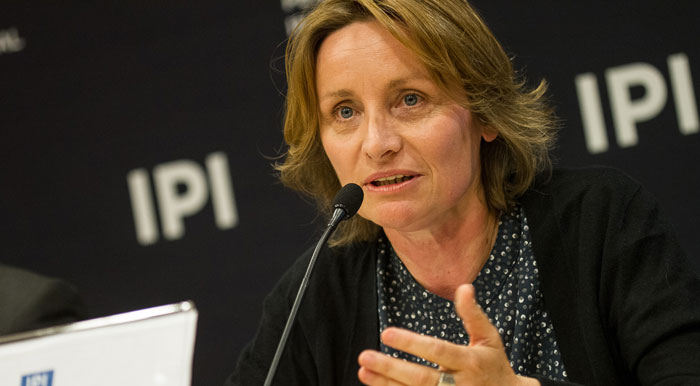
“There is no predetermined space of work for humanitarian action—there is no what we would call an ‘intangible right’ for humanitarian space that NGOs could claim by virtue of them being true humanitarians,” Sophie Delaunay, Executive Director of Doctors Without Borders/Médecins Sans Frontières (MSF) USA told an IPI lunchtime policy forum on April 11, 2012.
She was speaking on a panel discussing the difficulties in how humanitarian organizations access crisis zones. “There is a space of work that varies according to the crisis, that needs to be gained and to be conquered through negotiation with all the actors. These negotiations…always involve a degree of compromise,” she said.
Ms. Delaunay spoke about the findings of MSF’s recent book on this subject, Humanitarian Negotiations Revealed: The MSF Experience.
The book, she said, “is a very pragmatic look at how humanitarian organizations, specifically MSF, conducted negotiations and tried to preserve and implement its principles over the years.”
“There are two principles that we have tried to keep,” she said. “I think the authors want to show they are absolutely key, whatever the other compromise would be. The first one is, of course, medical ethics. The second is the independence of judgment, because with this compromise you lose your ability to define what is acceptable for the organization and what is not acceptable.”
In negotiating access, she said, “The way you actually manage negotiation is always driven by the benefit that you expect for patients. This is why you cannot define a priori where is the red line, because the red line is going to be the time you think the compromise outweighs the medical benefit you can have in this country. Given that medical impact and the magnitude of crisis depends from one country to another, then the red line is also moving.”
In the debates on how far to compromise, she said, “What remains is the permanent tension on access and ability to operate on the ground and the willingness to express our outrage, our indignation over what we witness.”
The other panelists were Louis-Georges Arsenault, UNICEF’s Director of Emergency Programmes; and Susie Linfield, Director of the Cultural Reporting and Criticism Program at the Arthur L. Carter Journalism Institute at New York University.
Mr. Arsenault said that UNICEF also asks the same questions as MSF in determining how much to compromise to gain access. “We are asking ourselves the question, ‘How much is it worth it?’ when we are compromising, but from a UNICEF standpoint, we could also say that every child’s life that we are saving is worth it. So, there is a give and take there.”
A key difference however, with MSF is that, at UNICEF, “We do not have an abstention or exit option. We are in countries to stay, to support its government and its people before, during, and after a crisis or conflict.”
He said, “We are a part of a system, and a decision on one part could impact the other. We have to remember that, and we may have different operational contexts, but we all share the same objectives.”
Ms. Linfield took a broader approach, placing the discussion in the historical context of the debate about the humanitarian movement, and rebutting the criticism it has received in recent years. “Humanitarian organizations,“ she said, “operate, by definition, amidst the ugliest conflicts on earth. It would be odd, indeed impossible, if they did not engage ugliness.”
Speaking of attacks on aid workers, she said, “In my view, the attacks on humanitarian workers are not mainly due to supposed ties to US or other militaries and NGOs. Rather, these attacks are part of a larger, international attack on the entire concept of the civilian.”
“No matter how neutral or independent humanitarian organizations are…aid workers will, I fear, continue to be attacked,” she said. “The denial of the whole category of the civilian is, I think, a kind of civilizational devolution that we are witnessing, and humanitarian organizations are, alas, on its front line.”
The event was moderated by Warren Hoge, IPI Senior Adviser for External Relations.
![]() Read/Listen to the Global Observatory interview with Sophie Delaunay
Read/Listen to the Global Observatory interview with Sophie Delaunay ![]()
Watch event:







